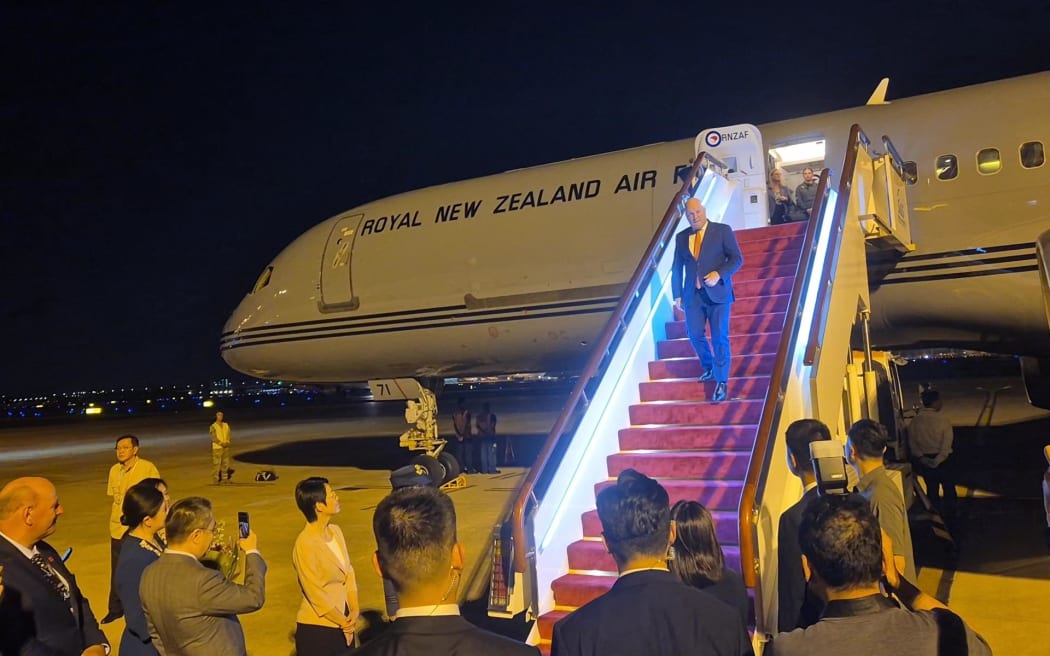Prime Minister Christopher Luxon has touched down in China early on Wednesday, kicking off his first visit there as prime minister - a trip analysts say will seek to consolidate the relationship rather than reinvigorate it.
The RNZAF Boeing 757 arrived in Shanghai at about 3:30am (NZT) after departing Auckland's Whenuapai Airbase more than 20 hours earlier.
Luxon will spend roughly two days in Shanghai, touting New Zealand's wares, and one in Beijing, holding high-level meetings with the Chinese administration.
To aid him in those goals, the PM has brought with him Tourism Minister Louise Upston, Ethnic Communities Minister Mark Mitchell, and a team of officials and business leaders.
Read a comprehensive preview of Luxon's China trip here.
Addressing the delegation before departure, Mitchell quipped it was like "getting the old band back together" after a trade mission to India in March.
He said the China visit was important right now given the immense global uncertainty.
"Probably never seen the amount of conflict that's going on… old alliances that are being challenged a bit," Mitchell said.
"Hopefully, touch wood, the 757 gets us up there."

Prime Minister Christopher Luxon and the rest of the delegation arrive in Shanghai after a 20-hour trip from Auckland. Photo: RNZ / Craig McCulloch
Upston said New Zealand had a "long and deep relationship" with China but there was more to be done.
"Particularly from a tourism and hospitality perspective, we're kind of lagging - so we've got a bit of serious heavy-lifting to do up there to make sure we can resurrect those very deep relationships and ensure the China market knows we're open for business."
The 28-strong business delegation is chaired by Dame Therese Walsh, chair of Air New Zealand and ASB Bank.
Among the companies represented are Fonterra, Zespri, A2 Milk, and Silver Fern Farms.
Also of note are education providers Te Pūkenga, Victoria University of Wellington, and UP Education, as well as both Auckland and Christchurch airports.
Luxon: 'Maybe listen a little less to former politicians'
In a sit-down interview with RNZ before departure, Luxon used a range of adjectives to describe the bilateral relationship: strong, mature, complex, considered, predictable.
"It's an important relationship. We're being consistent and steady with it," he said.
"We've got a good rapport with the leaders, and there's a lot more for us to build and develop within this relationship."
Earlier this month, a group of former political leaders - including Helen Clark, Sir Geoffrey Palmer, Sir David Carter, and Don Brash - criticised the coalition's approach to China as being needlessly "adversarial".
But Luxon dismissed the warning as incorrect and "a bit simplistic".
"We've been very consistent that where we have differences, we raise them, we do so publicly or privately, we call it out. And that's a sign of a good mature relationship."
RNZ asked whether he would directly raise those differences, whether on human rights or militarisation in the Pacific, during his meetings this week with President Xi Jinping and Premier Li Qiang.
"I don't talk about what I'm going to raise in those meetings in advance," Luxon said. "But suffice to say, I've been pretty consistent with how we how we run them."
He encouraged RNZ to "maybe listen a little less to former politicians" and said he was "not at all" concerned about a potential relationship breakdown.
"It is a more volatile world out there, and New Zealand can navigate those volatilities incredibly well," Luxon said.
"Yes, that comes with some challenges from time to time, but I'm very confident we can do that."
Young: 'Always potholes that NZ could fall into'
Contemporary China Research Centre director Jason Young said it was crucial for the government to get its messaging right on this trip: keeping the relationship "sustainable and stable" without raising expectations too much.
"Often within China, things can't really sit still. They have to keep moving," Young said.
"From a New Zealand end, it's more a question of demonstrating that the relationship is valuable and wanting to maintain the growth within that relationship at a sustainable level."
Young, who is an associate professor of international relations at Victoria University of Wellington, said the relationship had become "more strained" given the shifting geo-strategic environment.
He said there were plenty of differences that would have to be navigated: the recent Cook Islands deal, China's growing military power, and stability across the Taiwan Strait.
"As with any great power - and particularly a great power with a very different political system, a different view of geopolitics and their role in the world - there are always potholes that New Zealand could fall into," Young said.
"New Zealand is not immune from the broader geopolitical challenges, and navigating those challenges is going to be one of the hardest things that New Zealand does over the next couple of decades."
Professor of political science at the University of Canterbury Anne-Marie Brady told RNZ Luxon would use the visit to highlight positive areas of cooperation to protect the trading relationship.
But she expected Luxon would also voice his support for the "multilateral rules-based order" which was under threat from China.
"Both President Xi and Premier Li have pleaded with New Zealand to return to the old rubric for NZ-China relations, which was the 'relationship of the first' where New Zealand was going to jump in on every initiative that China launched.
"New Zealand doesn't use that language anymore. It uses the relationship of common points and difference."






